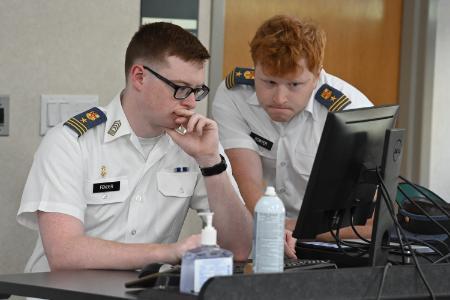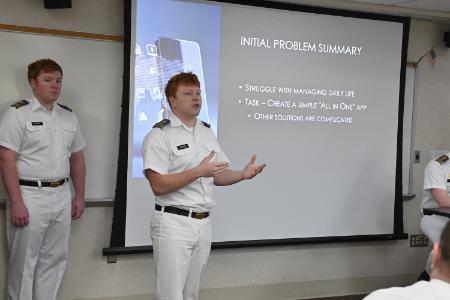ECE Cadets Present Capstone Projects

Caleb Fender ’25 and Cole Bowyer ’25 review their slide show before giving their capstone presentation. –VMI Photo by Kelly Nye.
LEXINGTON, Va. May 12, 2025 — Two teams of senior electrical and computer engineering (ECE) majors at Virginia Military Institute recently presented their capstone projects after working on them throughout the academic year. According to Col. David Feinauer, professor of ECE, the engineering capstone experience is an important milestone. “It is an academic crucible event where students are challenged and emerge stronger, more confident, and more prepared for their future careers.”
One team developed an app—compatible with 95% of android phones—to assist veterans with traumatic brain injury (TBI). The team received the request from three partners: Quality of Life Plus (QL+), a national nonprofit founded to engineer solutions for injured veterans and first responders; Craig Hospital, a neurorehabilitation and research hospital in Colorado that specializes in TBI rehabilitation; and Operation TBI Freedom (OTF), a program of Craig Hospital that provides support for veterans and active duty military personnel with TBI.
Cole Bowyer ’25, project manager for the TBI app, stated that people who suffer from TBI experience not only physical symptoms, but cognitive symptoms as well, including difficulty in understanding and concentrating, and frustration with certain undertakings.
“Many people with TBI struggle with their daily duties, which include setting reminders on their phone, preventing them to get to appointments on time. Our task was to create a simple all-in-one application to simplify the routines and increase independence for people with TBI. The app enables the user to easily display their calendar, see specific events, set personal reminders, store passwords, play brain games, and change settings.”
Kristie Yelinek, program manager for QL+, said the team delivered beyond expectations.
“This project does more than create solutions for those who’ve served; it gives VMI cadets hands-on experience in real-world engineering, user-centered design, and working directly with clients. As a proud community partner, QL+ connected the cadets with OTF and helped turn their innovative ideas into action. We can’t wait to see the app launch this summer.”
The second team designed a battery monitoring unit for field radios for the U.S. Army Combat Capabilities Development Command (DEVCOM) Star Challenge. The challenge is issued to senior military colleges to provide their students an opportunity to demonstrate their technical excellence in a competitive environment, and enhance the relationships between those colleges and the Army.
The competition was held April 14 at the DEVCOM headquarters at Aberdeen Proving Ground in Maryland. Competitors included two teams from The Citadel, one from Norwich University, and one from VMI. The challenge from DEVCOM read, “Soldiers’ success on the battlefield is reliant on multiple factors to include power, communication, situational awareness, and adaptability. Your challenge is to design a capability that speaks to the availability, sustainability, and/or distribution, monitoring and management of one or more of these elements across the battlefield in support of Army tactical systems and operational requirements.”
According to Brian Tavenner ’25, project manager for the team, the most important take-aways were, “power, communication, situational awareness, sustainability, monitoring, and management, with a focus on radios. We decided to passively pull battery data including state of charge, state of health, and time until empty. We believed those to be the most important values, and the easiest for an officer to understand when viewing it on a display.”
The team conducted multiple tests using civilian radios, along with a battery monitoring chip, and a Raspberry Pi, a small, affordable single-board computer, as a proof of concept. They proposed that their solution could apply to the PRC 152, a multiband handheld radio used by the military.
The team experienced partial success, but admitted there were limitations and challenges, and suggested the project be passed on to the next class for further work. They received honorable mention at the DEVCOM competition.
Marianne Hause
Communications & Marketing
VIRGINIA MILITARY INSTITUTE
.svg)
.png)